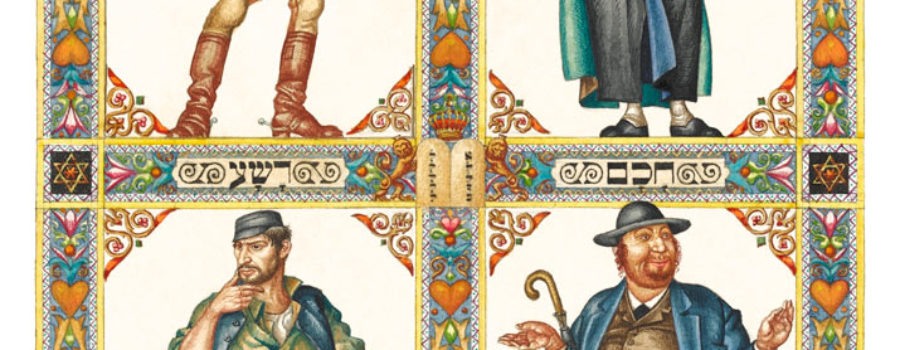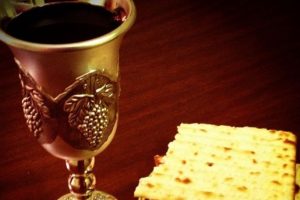The Passover Seder /’seɪdər/ (Hebrew: סֵדֶר [ˈsedeʁ] “order, arrangement;” Yiddish: סדר seyder) is a Jewish ritual feast that marks the beginning of the Jewish holiday of Passover. One of the rituals of the seder the account of the four types of sons.
The Four Sons
The Passover Haggadah speaks of “four sons”—one who is wise, one who is wicked, one who is simple, and one who does not know to ask. Each of these sons phrases his question about the seder in a different way. The Haggadah recommends answering each son according to his question, using one of the three verses in the Torah that refer to this exchange.
The wise son asks, “What are the statutes, the testimonies, and the laws that God has commanded you to do?” (Deut. 6:20) One explanation for why this very detailed-oriented question is categorized as wise, is that the wise son is trying to learn how to carry out the seder, rather than asking for someone else’s understanding of its meaning. He is answered fully: “You should reply to him with [all] the laws of Pesach: one may not eat any dessert after the paschal sacrifice.”
The wicked son, who asks, “What is this service to you?” (Ex. 12:26), is characterized by the Haggadah as isolating himself from the Jewish people, standing by objectively and watching their behavior rather than participating. Therefore, he is rebuked by the explanation that “It is because God acted for my sake when I left Egypt.” (Ex. 13:8) This implies that the Seder is not for the wicked son because the wicked son would not have deserved to be freed from Egyptian slavery. Where the four sons are illustrated in the Haggadah, this son has frequently been depicted as carrying weapons or wearing stylish contemporary fashions.
The simple son, who asks, “What is this?” (Ex. 13:14) is answered with “With a strong hand the Almighty led us out from Egypt, from the house of bondage.” (Ex. 13:14)
And the one who does not know to ask is told, “It is because of what the Almighty did for me when I left Egypt.” (Ex. 13:8).
Alma’s Admonition to his Three Sons
This corresponds closely to Alma’s admonition to his three sons. We read in Alma:
Therefore, he caused that his sons should be gathered together, that he might give unto them, every one, his charge separately, concerning the things pertaining unto righteousness. And we have an account of his commandments which he gave unto them, according to his own record. (Alma 16:45)
As we continue to read Alma’s admonitions, it appears evident that the occasion for which Alma “caused that his sons should be gathered together” was that of a Passover Seder.
Alma’s admonition to Helaman (Alma 17) corresponds to the that of the wise son. In fact the word “wisdom” appears eight times in Alma’s admonition to Chelaman. Alma begins his admonition to Helaman with these words:
My son, give ear to my words, for I swear unto you that inasmuch as you shall keep the mitzvot of Elohim, you shall prosper in the land. I would that you should do as I have done in remembering the captivity of our fathers; for they were in bondage and none could deliver them, except it were the Elohi of Avraham, and the Elohi of Yitz’chak, and the Elohi of Ya’akov. And he surely did deliver them in their afflictions. And now, O my son Cheleman, behold, you are in your youth, and therefore I implore you that you will hear my words and learn of me. For I do know that whosoever shall put their trust in Elohim shall be supported in their trials, and their troubles, and their afflictions, and shall be lifted up at the last day. And I would not that you think that I know of myself — not of the temporal, but of the spiritual, not of the carnal mind, but of Elohim. (Alma 17:1)
Alma’s admonition to Corianton (Alma 19) corresponds to that of the wicked, indifferent son. Alma opens this admonition with these words:
And now, my son, I have somewhat more to say unto you than what I said unto your brother. For behold, have you not observed the steadiness of your brother? His faithfulness and his diligence in keeping the mitzvot of Elohim? Behold, has he not set a good example for you? For you did not give so much heed unto my words as did your brother among the people of the Tzuramites. Now this is what I have against you: you did go on unto boasting in your strength and your wisdom. And this is not all, my son. You did do that which was grievous unto me, for you did abandon the ministry, and did go over into the land of Siron among the borders of the Lamanites after the harlot Isabel. Yes, she did steal away the hearts of many, but this was no excuse for you, my son. You should have tended to the ministry with which you were entrusted. Do you not know, my son, that these things are an abomination in the sight of YHWH, yes, most abominable above all sins, except it be the shedding of innocent blood or denying the Ruach HaKodesh? For behold, if you deny the Ruach HaKodesh when it once has had place in you, and you know that you deny it, behold, this is a sin which is unpardonable. Yes, and whosoever murders against the light and knowledge of Elohim, it is not easy for him to obtain forgiveness; yes, I say unto you, my son, that it is not easy for him to obtain forgiveness.
2 And now, my son, I would to Elohim that you had not been guilty of so great a crime. I would not dwell upon your crimes to torment your soul if it were not for your good. But behold, you cannot hide your crimes from Elohim, and except you repent, they will stand as a testimony against you at the last day. Now, my son, I would that you should repent, and abandon your sins, and go no more after the lusts of your eyes, but contain yourself in all these things; for except you do this, you can in no way inherit the kingdom of Elohim. Oh remember, and take it upon you, and contain yourself in these things. And I command you to take it upon you to counsel with your elder brothers in your undertakings. For behold, you are in your youth, and you stand in need to be nourished by your brothers and give heed to their counsel. Do not allow yourself to be led away by any vain or foolish thing; Do not allow HaSatan to lead away your heart again after those wicked harlots. Behold, O my son, how great iniquity you brought upon the Tzuramites; for when they saw your conduct, they would not believe in my words. And now the spirit of YHWH does say unto me, Command your children to do good, lest they lead away the hearts of many people to destruction. Therefore, I command you, my son, in the fear of Elohim, that you refrain from your iniquities, that you turn to YHWH with all your mind, might, and strength, that you lead away the hearts of no more to do wickedly, but rather return unto them, and acknowledge your faults, and repair that wrong which you have done. Seek not after riches nor the vain things of this world, for behold, you cannot carry them with you. (Alma 19:1-2)
Finally Alma’s admonition to Shiblon (Alma 18) corresponds to that of the simple son. Alma tells Shiblon:
My son, give ear to my words, for I say unto you even as I said unto Cheleman, that inasmuch as you shall keep the mitzvot of Elohim, you shall prosper in the land; and inasmuch as you will not keep the mitzvot of Elohim, you shall be cast off from his presence. And now, my son, I trust that I shall have great joy in you because of your steadiness and your faithfulness unto Elohim. For as you have commenced in your youth to look to YHWH your Elohim, even so I hope that you will continue in keeping his mitzvot, for blessed is he that endures to the end. I say unto you, my son, that I have had great joy in you already because of your faithfulness, and your diligence, and your patience, and your long-suffering, among the people of the Tzuramites. For I knew that you were in bonds; yes, and I also knew that you were stoned for the word’s sake, and you did bear all these things with patience because YHWH was with you; and now you know that YHWH did deliver you. (Alma 18:1)
Passover is a wonderful time for us to review Alma’s admonition to his three sons. Those who hold a seder may want to incorporate this material into their seder as part of the account of the four types of sons. And let us all choose to be like Cheleman, the wise son.






Leave a Reply